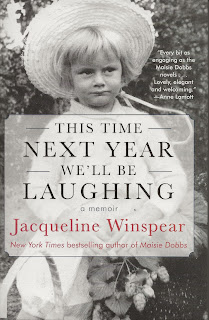This Time Next Year We’ll Be Laughing by Jacqueline Winspear
The message of this simple yet profound little book is stated quite clearly by Ms. Winspear. “We are all of us products of our family mythology. Stories are not only passed down, but nested in every cell.” She goes on to say if you write a memoir it must of necessity be about your parents (or I suppose your lack of them) because everything is underpinned by how they reacted to what was going on around them as you are growing up in their presence. The title comes from one of Winspear’s father’s favorite phrases. He was an explosives expert in WWII and came back from the front toward end of the war and finding London in ruins said, "This time next year we'll be laughing." She remembers him saying that same phrase many more times over the years.
If you pick up this book it will probably be because you have read and enjoyed some or all of the fine Maisie Dobbs novels that Winspear has written. You will not be disappointed because it will add some fascinating insights into how the author’s life seems to have been a predicate for her writing and the character of Maisie Dobbs herself. Artistry, whether on canvas, stage, or page tends to prioritize the looking at things in a new or different way and Winspear’s father above all wanted his children, as she put it, "to think different." One story she relates is when her dad sees her trying to imprint a Tee-shirt to follow a current fashion and says, ”Why would you want to be like everyone else?” Then he went on to make her do a new and different original design for the shirt.
Inbetween her evocative descriptions of the English countryside and the constant financial insecurity of her family, we also get several revealing comments about the nature of “memoir” writing itself. I liked particularly her discussion of how writing a memoir was like a quest into a tunnel of veils. You pull one after another back and then have to wonder if the event you are recalling really happened the way you now remember it. Has what has happened since in some way made your current memory false? Or even more provocatively are there elements in your life experiences that have stuck in your memory, but should have been discarded long ago because they sent you down unnecessary or painful blind alleys?
Let me say finally that if you are a lover of England and its landscape and history, and its attitudes toward life, you can still enjoy this one without having read any of her novels. She comes off as someone I would love to get to know personally.





No comments:
Post a Comment